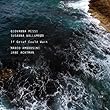 Spiritual desolation is expressed by the lonely simplicity of “The Plaint,” written by Henry Purcell, containing the lines, “I’ll hide me from the sight of day, and sigh, and sigh my soul away.” We may want to be alone, but others do not always let us alone. The question “Who shall I say is calling?” is asked in the composition “Who by Fire.” In Leonard Cohen’s “Who by Fire,” a well-known song, incantatory, the lyrics suggest the different circumstances of address, as if in private or public ritual; and it is great having it near the beginning of If Grief Could Wait, adding energy and mystique.
Spiritual desolation is expressed by the lonely simplicity of “The Plaint,” written by Henry Purcell, containing the lines, “I’ll hide me from the sight of day, and sigh, and sigh my soul away.” We may want to be alone, but others do not always let us alone. The question “Who shall I say is calling?” is asked in the composition “Who by Fire.” In Leonard Cohen’s “Who by Fire,” a well-known song, incantatory, the lyrics suggest the different circumstances of address, as if in private or public ritual; and it is great having it near the beginning of If Grief Could Wait, adding energy and mystique.
Category: Music reviews
Hop Over the Squares: Black Lace Freudian Slip by Rene Marie
 In the song the time is late and Rene Marie is ready for home, love, rest, as “tomorrow is already today.” I began by commenting that Black Lace Freudian Slip is a master class in good, possibly great, singing; and my hesitation was due to my perception that a definitive assertion of rare and important quality—of greatness—can be off-putting when it comes blunt and fast, but this is what I think: Rene Marie is a great singer.
In the song the time is late and Rene Marie is ready for home, love, rest, as “tomorrow is already today.” I began by commenting that Black Lace Freudian Slip is a master class in good, possibly great, singing; and my hesitation was due to my perception that a definitive assertion of rare and important quality—of greatness—can be off-putting when it comes blunt and fast, but this is what I think: Rene Marie is a great singer.
A Garden of Wisdom, from Some Long-Ago Dream: Carole King’s Tapestry
On Tapestry, King’s singing, sincere and strong, is quite good in “I Feel the Earth Move,” which has a driving rhythm and engaging melody, and uses earthquake as a metaphor for a stirring love. The song is more dramatic than romantic, as it contains energy and hunger. It is followed by the ballad “So Far Away,” in the album’s regular pattern of an uptempo song followed by a ballad. One can hear a little jazz in “It’s Too Late,” a rock song about a failing relationship, the rhythms of the song matching the intensity of the situation.
When Strength is Earned and Becomes Beauty: On Tina Turner, “I Might Have Been Queen,” Private Dancer, Break Every Rule, Foreign Affair, and More
 Tina Turner: hair, eyes, mouth, teeth. Glowing brown skin. Breast, hips, legs. A burst of dazzling energy. Honesty and passion. Dignity and sexiness. Tough history, tougher spirit. Serenity sought and found. A new telling of a woman’s story, of an American life—and the evolution of an international artist and entertainer. In “I Might Have Been Queen,” a song that she sings with sorrow and pride, with resignation and triumph, Tina Turner looks out over time, looks at and through history, and sees no tragedy.
Tina Turner: hair, eyes, mouth, teeth. Glowing brown skin. Breast, hips, legs. A burst of dazzling energy. Honesty and passion. Dignity and sexiness. Tough history, tougher spirit. Serenity sought and found. A new telling of a woman’s story, of an American life—and the evolution of an international artist and entertainer. In “I Might Have Been Queen,” a song that she sings with sorrow and pride, with resignation and triumph, Tina Turner looks out over time, looks at and through history, and sees no tragedy.
Seven Compositions (Here Playful, There Serious): Beautiful Mechanical by the classical group yMusic
 On Beautiful Mechanical, the title song has a nearly comic frantic energy, something the strings both soften and deepen, before going off on their own quick currency against a droning beat. The piece is actually hard to grasp, to think about, as it contains much frequently fast textured movement. “Proven Badlands,” featuring cello and horn, is slow, sonorous, and has a cinematic quality, especially in the rise of the horns in repeated phrases. The high, mellow but still sharp, soaring trumpet playing, and a three-beat rhythm, and a scraping against strings, distinguish it.
On Beautiful Mechanical, the title song has a nearly comic frantic energy, something the strings both soften and deepen, before going off on their own quick currency against a droning beat. The piece is actually hard to grasp, to think about, as it contains much frequently fast textured movement. “Proven Badlands,” featuring cello and horn, is slow, sonorous, and has a cinematic quality, especially in the rise of the horns in repeated phrases. The high, mellow but still sharp, soaring trumpet playing, and a three-beat rhythm, and a scraping against strings, distinguish it.
The Use of Quiet Powers: The Very Best of Mariah Carey
 So much for failure in love. Mariah Carey’s voice can sound hammer-strong or feather-light, and she uses different parts of her voice in “Breakdown,” which opens with a man’s chanting voice (the voice, appearing in different instances in the song, makes the song nearly a duet, which is odd since most of the lyrics focus on separation). It is a song with texture—layers of sound, and rhythms going in more than one direction.
So much for failure in love. Mariah Carey’s voice can sound hammer-strong or feather-light, and she uses different parts of her voice in “Breakdown,” which opens with a man’s chanting voice (the voice, appearing in different instances in the song, makes the song nearly a duet, which is odd since most of the lyrics focus on separation). It is a song with texture—layers of sound, and rhythms going in more than one direction.
We Are Better (Attitude in Urban Dance): Renegades by Mark de Clive-Lowe, with Omar, Sheila Escovedo, and Nia Andrews
 The eastern-sounding “Alabi” begins Mark de Clive-Lowe’s Renegades, followed by an invocation to dance, to communal pleasure, “Get Started,” which has chanting, and features soul singer Omar and a lot of Shelia E.’s percussion. Is the pleasure only in being together and dancing? Is there any other connection or purpose?
The eastern-sounding “Alabi” begins Mark de Clive-Lowe’s Renegades, followed by an invocation to dance, to communal pleasure, “Get Started,” which has chanting, and features soul singer Omar and a lot of Shelia E.’s percussion. Is the pleasure only in being together and dancing? Is there any other connection or purpose?
That’s the Way Love Is: The Best of Marvin Gaye, The 60s
 The music listener heard references to family, church, and school in Gaye’s work, those early educators and touchstones, the expected resources for affection and knowledge, and often what must be left behind if life is to be lived fully or honestly. Leaving them behind meant freedom—and risk, if not trouble. There is a female choral arrangement in “Pride and Joy,” and it is somewhere between male doo-wop and the call and response of a church choir.
The music listener heard references to family, church, and school in Gaye’s work, those early educators and touchstones, the expected resources for affection and knowledge, and often what must be left behind if life is to be lived fully or honestly. Leaving them behind meant freedom—and risk, if not trouble. There is a female choral arrangement in “Pride and Joy,” and it is somewhere between male doo-wop and the call and response of a church choir.
Emotion and Style, Jazz and Soul: Until Tomorrow by Zara McFarlane
 Zara McFarlane’s voice can be really pure or take on a husky quality, and her inflections are subtle, varied, as in “Captured (part 3), a song about the memory of a woman, with a swinging rhythm. Delivered with syncopation, the lyrics of “Mama Done” suggest something ominous: “she talked herself right into the ground.” McFarlane’s voice floats in the air in the song “Until Tomorrow,” which seems to be about an impasse in a relationship that time and distance might ease. Her voice could be a sound alive on the wind, without a body.
Zara McFarlane’s voice can be really pure or take on a husky quality, and her inflections are subtle, varied, as in “Captured (part 3), a song about the memory of a woman, with a swinging rhythm. Delivered with syncopation, the lyrics of “Mama Done” suggest something ominous: “she talked herself right into the ground.” McFarlane’s voice floats in the air in the song “Until Tomorrow,” which seems to be about an impasse in a relationship that time and distance might ease. Her voice could be a sound alive on the wind, without a body.
Freedom in Contemporary Cuban Music: Gilles Peterson Presents Havana Cultura, The Search Continues
 The production quality of the Havana Cultura music is quite good; the current development of technology facilitates first-rate recording sound, no matter where one is recording, something very different from the anthropological work of decades ago. The horn sounds official, triumphalist in “La Vida Interlude,” but the beat in the song is great.
The production quality of the Havana Cultura music is quite good; the current development of technology facilitates first-rate recording sound, no matter where one is recording, something very different from the anthropological work of decades ago. The horn sounds official, triumphalist in “La Vida Interlude,” but the beat in the song is great.